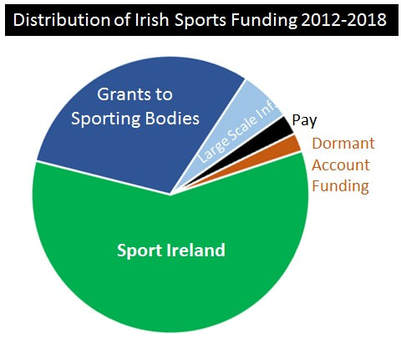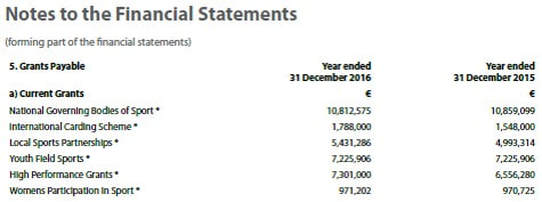Examining the period since 2012 also allows us to assess the period of Fine Gael led administrations. The distribution of Exchequer sports expenditure by line item (Vote 31) is illustrated in the pie chart below.
|
By John Considine Austerity in the UK is coming to an end. At least that is what the UK Chancellor of the Exchequer told those listening to his Budget Speech. It has probably ended in Ireland a few years ago (although you will find a few rare birds who claim there was no austerity, a few more who will claim it remains, and one or two others who will insist the term is meaningless). If one is to judge by non-capital Exchequer expenditure on sport then the "recovery" has been in progress since about 2013. Since 2012 non-capital sports expenditure has increased marginally as a proportion of overall non-capital expenditure. Examining the period since 2012 also allows us to assess the period of Fine Gael led administrations. The distribution of Exchequer sports expenditure by line item (Vote 31) is illustrated in the pie chart below. The Exchequer expenditure on Sport Ireland accounts for just under 60% of the total for the period 2012-18. (Broadly speaking one could add the Dormant Account Funding to this figure as this funding shows up in the accounts of Sport Ireland.) The vast majority of expenditure on Sport Ireland is classified as non-capital. Turning to the how Sport Ireland uses this money, we see that the biggest item of expenditure in the Sport Ireland accounts is the grants. Effectively, the government outsources the task of managing this non-capital expenditure to Sport Ireland. A screen shot of some of the relevant grants is provided below (these are from the latest Annual Accounts on the Sport Ireland website). Outside of pay, the remaining items in the pie chart are capital grants administered by the Department of Transport, Tourism and Sport. The political bias in these allocations has provided the basis for plenty of discussion in a variety of places (including on this blog, e.g. here). By their nature, capital grants allow the decision maker greater influence. It also opens up the opportunity for credit-claiming. This is more difficult for non-capital grants. As the screenshot above shows, non-capital grants are reoccurring and changes are usually incremental. Less room for credit-claiming.
Comments are closed.
|
Archives
June 2024
About
This website was founded in July 2013. Categories
All
|


 RSS Feed
RSS Feed